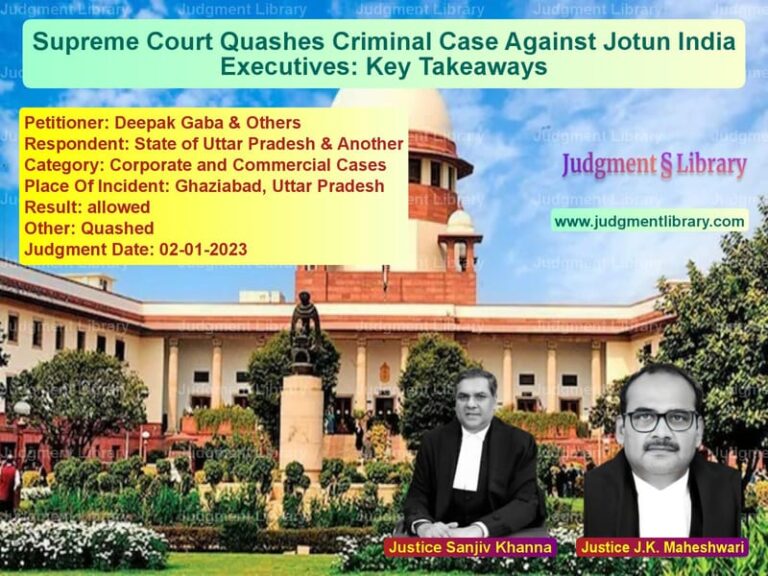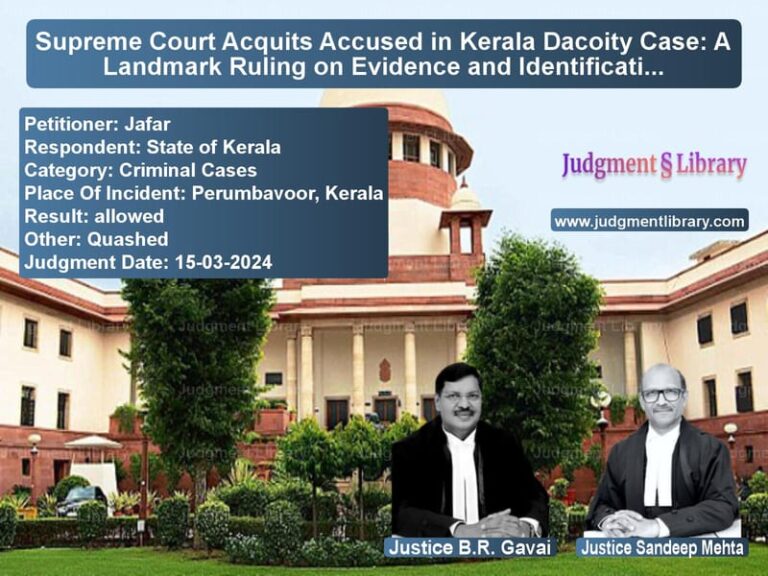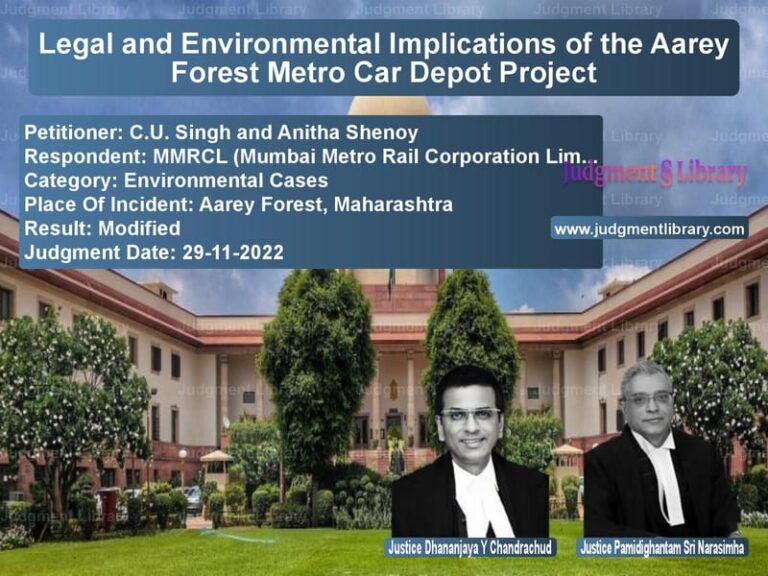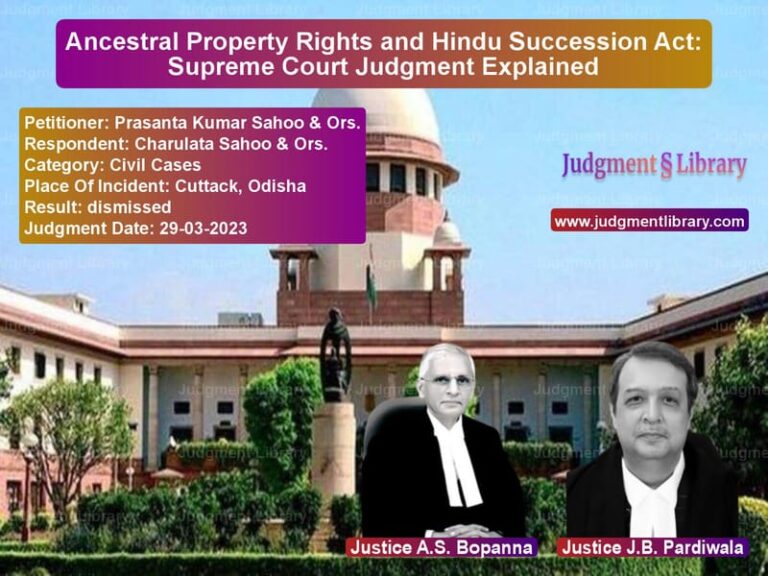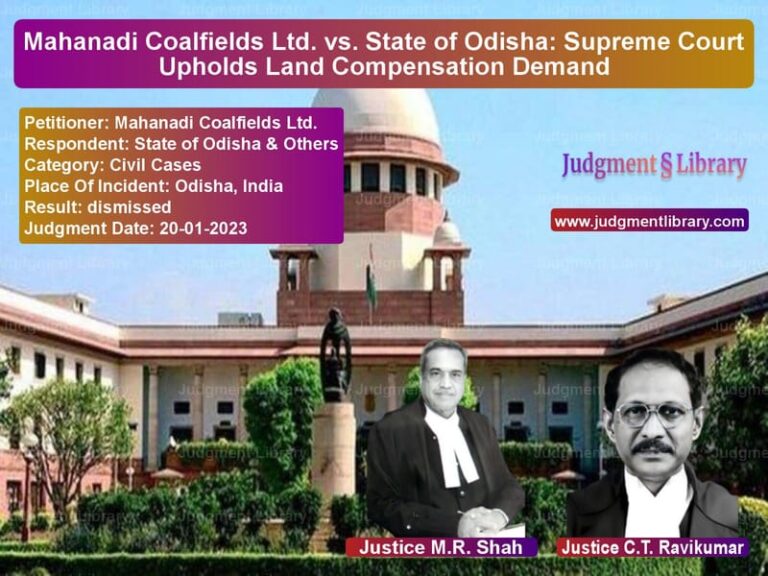Uttar Pradesh Technician Grade-II Recruitment: Mukul Kumar Tyagi vs State of Uttar Pradesh
This case involves appeals concerning the selection process for the post of Technician Grade-II by the Uttar Pradesh Power Corporation Limited (UPPCL), based on an advertisement issued by the Electricity Service Commission. The appellants, Mukul Kumar Tyagi, Rajiv Kumar, and Ravi Prakash, had participated in the recruitment process but were aggrieved by the revision of the select list and certain exclusions from the list. The key issue is the validity of qualifications accepted for the recruitment, particularly regarding the Computer Course Certificate (CCC), and whether candidates with unrecognized qualifications were improperly included in the select list.
Key Facts of the Case:
- The appellants were candidates who participated in the recruitment process for 2211 vacancies of Technician Grade-II posts, as advertised by the Uttar Pradesh Power Corporation Limited (UPPCL).
- The advertisement stipulated that candidates should have a CCC certificate or an equivalent computer qualification.
- The petitioners claimed that candidates who did not meet the qualification requirements, particularly in terms of the CCC certificate from the recognized DOEACC/NIELIT, had been wrongfully included in the select list. The appellants argued that this violated the eligibility criteria set out in the advertisement.
- The original select list, published in 2015, included candidates whose qualifications were not aligned with the prescribed CCC certificate, leading to disputes and subsequent litigation.
- The matter escalated to the High Court, which ruled in favor of those excluded from the select list and ordered that the select list be revised to include only those who held the recognized CCC certificate or its equivalent.
Petitioner and Respondent Arguments:
Petitioner (Mukul Kumar Tyagi & Others): The petitioners argued that the original select list, published by the Commission, was flawed as it included candidates who did not meet the prescribed educational qualifications. They contended that those who did not possess the CCC certificate from NIELIT, or its equivalent, should not have been included in the select list. The petitioners claimed that the self-certification by candidates claiming equivalency to CCC was not authorized, and the Commission failed to verify these claims adequately.
Respondent (State of Uttar Pradesh & Others): The respondents, including the Uttar Pradesh Power Corporation and the Electricity Service Commission, defended the recruitment process. They argued that the guidelines issued by the Commission allowed for self-certification, and no errors were made in the selection of candidates. The respondents pointed out that the selection process had been carried out in accordance with the Government’s Order, and candidates had been included in the list based on their qualifications, which were deemed equivalent by the recruiting agency.
Important Judge Arguments:
Justice Ashok Bhushan: Justice Bhushan observed that the key issue was the failure of the Commission to properly verify the equivalency of computer qualifications claimed by candidates. He emphasized that self-certification by candidates was not sufficient to establish equivalency and that the Commission had a duty to thoroughly scrutinize the qualifications before including candidates in the select list. Justice Bhushan noted that candidates who submitted qualifications from unrecognized private institutions should not have been included in the list unless the qualifications were verified.
Justice Navin Sinha: Justice Sinha concurred with the findings of Justice Bhushan, stating that the Commission’s failure to properly verify the qualifications and qualifications equivalency had led to the wrongful inclusion of unqualified candidates in the select list. He stressed that the responsibility of ensuring compliance with qualification standards rests with the recruiting agency and that self-certification should not be relied upon as the sole criterion for inclusion in the list.
Legal Provisions Discussed:
- Article 16 of the Constitution of India: This article guarantees equality of opportunity in public employment and mandates that appointments to public offices must adhere to fair and transparent procedures. The petitioners argued that the inclusion of unqualified candidates in the select list violated this principle.
- Uttar Pradesh Electricity Service Commission Regulations, 1995: The regulations provided the qualifications required for the Technician Grade-II post, including the requirement of a CCC certificate or an equivalent qualification for candidates.
- Government Orders dated 05.07.2013 and 03.05.2016: These orders clarified the eligibility criteria and equivalency standards for computer qualifications, particularly concerning the CCC certificate. The Court noted that these orders were crucial in determining whether candidates possessed the required qualifications for the post.
Final Judgment:
The Supreme Court allowed the appeal, setting aside the judgment of the Division Bench. The Court upheld the judgment of the learned Single Judge, which directed the Commission to exclude candidates from the select list who did not possess the recognized CCC certificate or an equivalent qualification. The Court emphasized that the qualifications prescribed in the advertisement were mandatory and that the Commission had a responsibility to verify candidates’ qualifications to ensure compliance with the rules. The judgment also noted that self-certification by candidates regarding their qualifications was insufficient and that the Commission failed to conduct due diligence in verifying qualifications before finalizing the select list.
Conclusion:
This judgment reinforces the principle that public recruitment processes must be transparent, rigorous, and based on fair evaluation of candidates’ qualifications. It underscores the responsibility of recruiting agencies to ensure that only eligible candidates, who meet the prescribed criteria, are included in the select list. The case also highlights the importance of adhering to constitutional provisions related to equality in public employment and ensuring that qualifications for public posts are accurately verified before appointments are made.
Petitioner Name: Mukul Kumar Tyagi.Respondent Name: State of Uttar Pradesh & Others.Judgment By: Justice Ashok Bhushan, Justice Navin Sinha.Place Of Incident: Uttar Pradesh.Judgment Date: 16-12-2019.
Don’t miss out on the full details! Download the complete judgment in PDF format below and gain valuable insights instantly!
Download Judgment: Mukul Kumar Tyagi vs State of Uttar Prade Supreme Court of India Judgment Dated 16-12-2019.pdf
Direct Downlaod Judgment: Direct downlaod this Judgment
See all petitions in Employment Disputes
See all petitions in Public Sector Employees
See all petitions in Recruitment Policies
See all petitions in Judgment by Ashok Bhushan
See all petitions in Judgment by Navin Sinha
See all petitions in allowed
See all petitions in supreme court of India judgments December 2019
See all petitions in 2019 judgments
See all posts in Service Matters Category
See all allowed petitions in Service Matters Category
See all Dismissed petitions in Service Matters Category
See all partially allowed petitions in Service Matters Category


